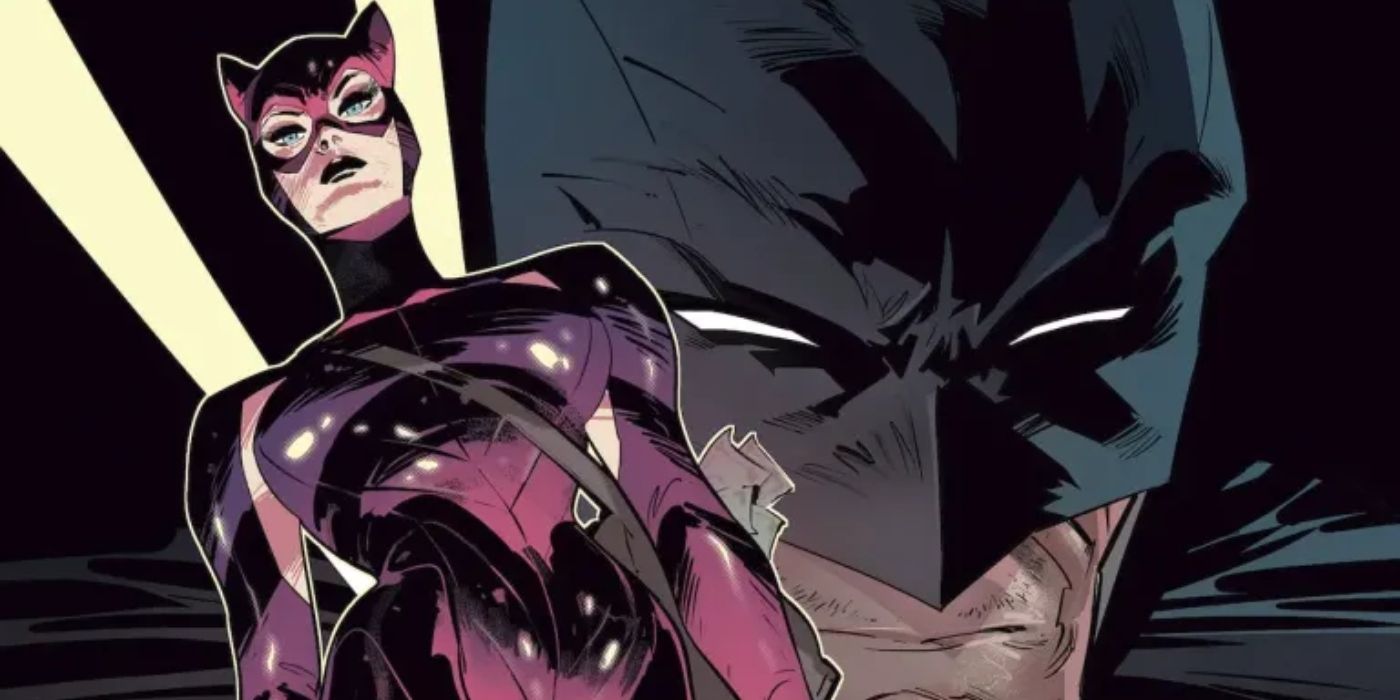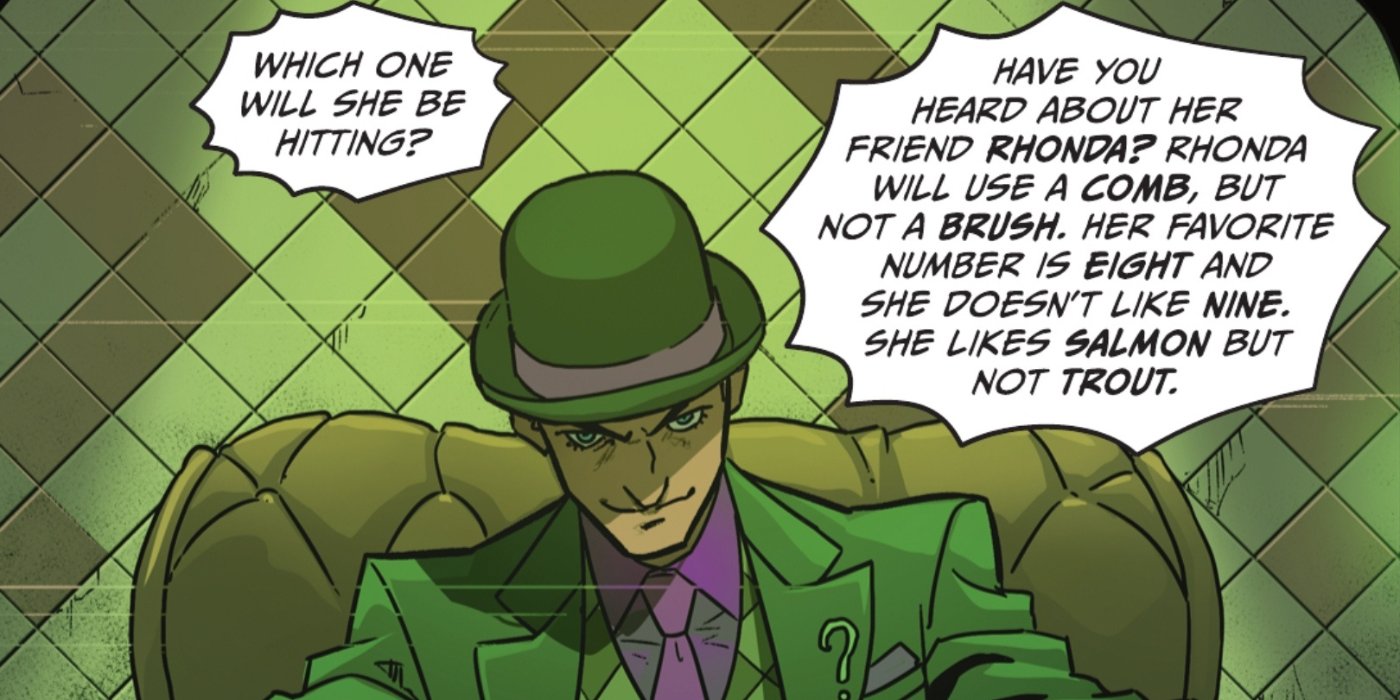Summary
- Batman's decision to accept the help of the Riddler undermines his moral position.
- Batman's alliance with the Riddler makes him a hypocrite, as he has previously condemned others for working with criminals but is willing to do the same when it benefits him.
- By accepting the Riddler's help, Batman has substantially weakened his argument against granting criminals leniency.
The following contains spoilers for Catwoman #57, now on sale from DC Comics
Batman and the rest of the Bat-Family are embroiled in a tricky situation. The Gotham War has pit them against one another over the future of Gotham City, with Batman's black-and-white morality coming up against a more complex argument from Catwoman. This conflict has already set the heroes against each other, and the latest blow makes things even more difficult to handle.
Batman's been much harsher in his summation of crime in Gotham City than his allies, calling them out for even considering Catwoman's proposal of allowing some criminals to run free if it means a safer Gotham. However, his decision to accept Riddler's assistance in Catwoman #57 (by Tini Howard, Nico Leon, Veronica Gandini, and Lucas Gattoni) subsequently comes off as incredibly hypocritical, as he's willing to accept the help of a mass murderer just to stop car thieves. This also undercuts his argument to the rest of the Bat-Family, and could come back to haunt him down the line.
How the Riddler Helps Batman
The Gotham War has become an increasingly hectic time for Batman and his various allies. Catwoman's proposal to the Bat-Family of training regular criminals to follow her specific moral code could change the way the city works going forward, reducing needless violence and crime across Gotham City. But doing so would also place the heroes in a position to allow criminal activity to be carried out across the city. While the Bat-Family understands Catwoman's arguments but hasn't yet been swayed (outside of Red Hood, who's seemingly invested fully in her arguments), Batman remains firmly opposed to the idea. The Caped Crusader's black-and-white mentality doesn't allow for any wiggle room in the conflict, pushing him to fight against both his and Catwoman's allies. But as he makes his way through Gotham, Batman is approached by one of his oldest enemies: the Riddler.
Catwoman's efforts have severely damaged the traditional supervillains of Gotham, as a newly emboldened class of street-level thieves are far less likely to rely on big name criminals for support. This results in the city having far fewer henchmen and minions around that can recruited by villains for their plans. While some of these rogues have been operating in secret, the Riddler decides to be proactive. Attracting the Dark Knight's attention and luring him into a communications room, the villain sends a Batman a "helpful" message in the form of a riddle. Solving it leads Batman to Catwoman's next intended target, and the fact that the Caped Crusader accepts the Riddler's help in this way is a serious blow to his argument against giving criminals passes for any reason, especially considering just how dangerous the Riddler has proven to be, especially as of late.
Accepting Riddler's Help Makes Batman A Hypocrite
During the Dark Knight's confrontation with his allies, he calls them out for not seeing the world as he does. His internal monologues have become harsher, with Batman claiming there can't ever be allowances for criminals, regardless of what code they follow. Crime has consequences, and accepting it only invites ruin. But when Riddler openly communicates with him, Batman doesn't try to hack Riddler's signal or take the time to hunt down one of his most dangerous foes. It's important to remember that the enigmatic villain is a mass murderer who has a grim tendency to leave a trail of bodies in his wake. But Batman instead targets his former ally and beats him unconscious, all while leaving the Riddler to continue his machinations. Jason even draws attention to this, calling out Batman for relying on "friends in low places." Regardless, Batman takes the opportunity to knock out and capture Red Hood, going so far as to use him as bait to lure Catwoman into a trap. It's notable that at this moment, Batman admits that he's not proud of his actions.
This suggests that Batman is aware of the moral lines he's crossing in his war against Catwoman. What makes matters worse is that he is aware Riddler is using him. Gotham's supervillains want things to revert to the status quo before the trajectory of the entire city is changed. Batman ignoring the Riddler to target his old allies means he's effectively ignoring his rhetoric when it's useful to him. He may call out Tim Drake for even considering giving a robber a pass, but he's allowing a confessed and repeat murderer to run free because he decided another lawbreaker was more deserving of his attention. Batman essentially allows a criminal to evade capture, because of what said villain is contributing to his cause, and he has condemned his allies for doing the exact same thing.
Even if Batman intends to hunt down Riddler when he's done, this transactional partnership highlights a deep hypocrisy. He holds his allies to task when they work with criminals but will do so when it benefits him. This single act undermines much of Batman's arguments that the war on crime must not accomodate criminals in any way. Riddler notes, "the enemy of my enemy is my friend," and Batman appears to have (at least temporarily) taken on a similar policy - even at the cost of becoming a hypocrite in the process.



